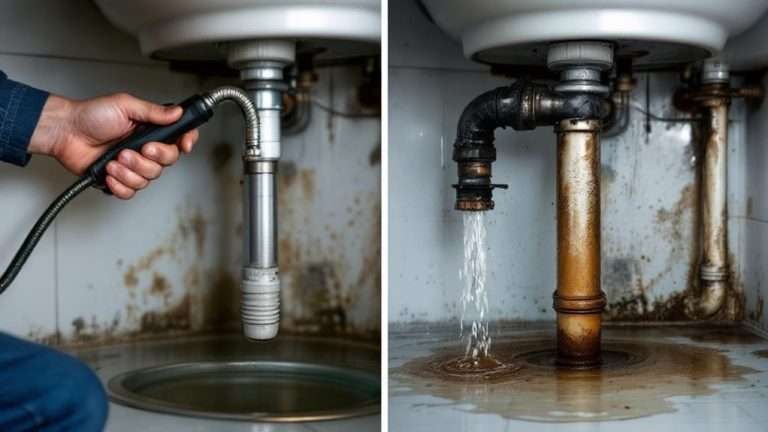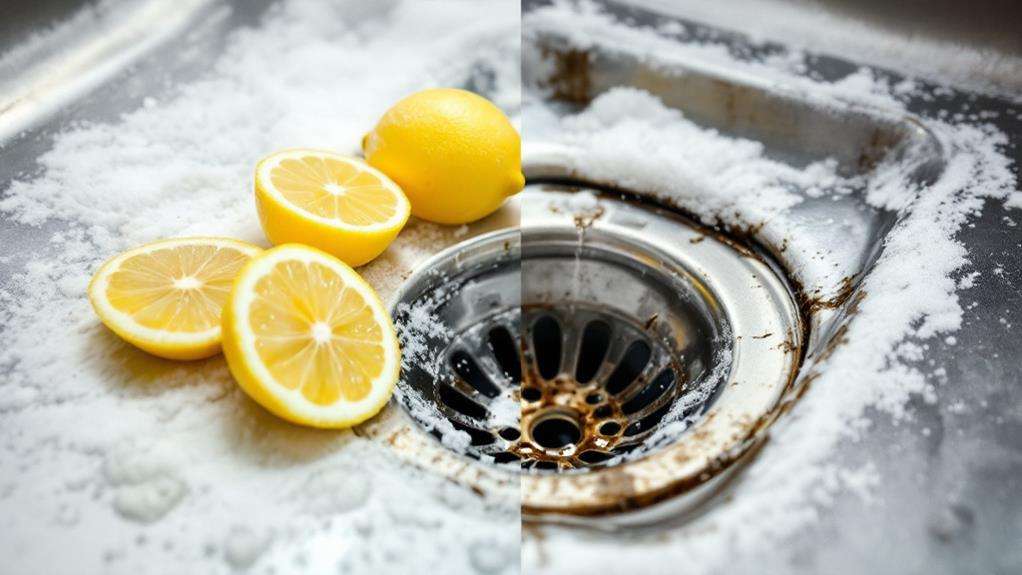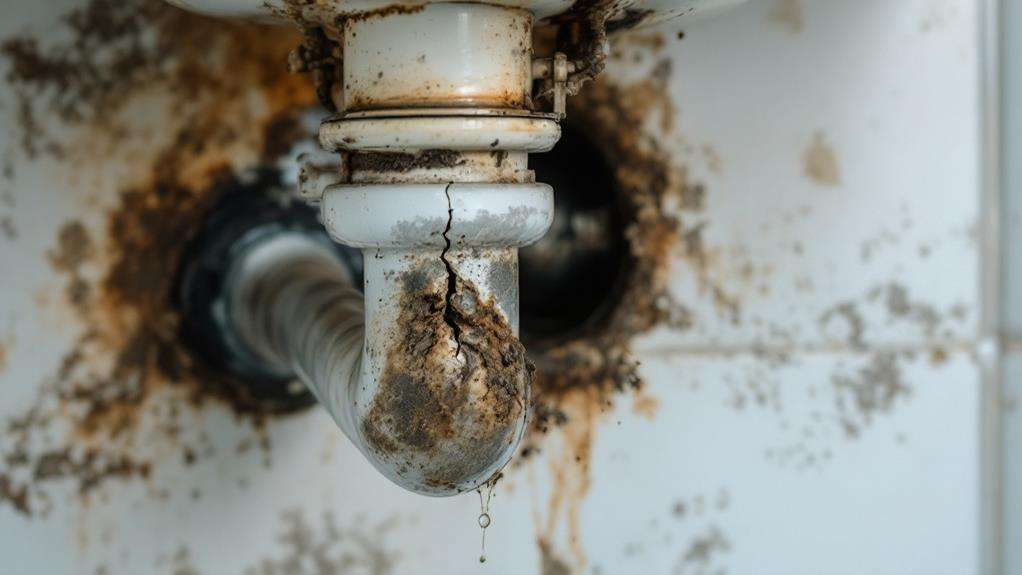Why Your Home'S Drain System Needs Regular Maintenance

Your home's drain system needs regular maintenance to prevent costly clogs, extend pipe lifespan, eliminate foul odors, improve water flow, and detect hidden issues early. By avoiding disposal of grease and debris, using drain screens, and scheduling professional inspections, you'll keep your pipes in top shape. Regular cleaning with natural solutions like baking soda and vinegar can deodorize and maintain proper flow. Proactive maintenance helps you avoid expensive repairs and inconvenient backups. Don't wait for problems to arise; taking care of your drains now can save you time, money, and headaches in the long run. Uncover how simple steps can protect your home's plumbing system.
Prevent Costly Clogs
One of the most effective ways to maintain your home's drain system is by preventing clogs before they occur. Regular maintenance can save you from costly repairs and improve drainage efficiency throughout your home. Start by being mindful of what goes down your drains. Avoid disposing of grease, coffee grounds, and fibrous materials in your kitchen sink. In bathrooms, use hair catchers in showers and tubs to prevent hair from accumulating in pipes.
Periodically flush your drains with hot water to dissolve minor buildup and keep pipes clear. For an extra amplification, use a mixture of baking soda and vinegar followed by hot water to naturally clean your drains. This practice can help prevent recurring clogs and maintain smooth water flow. Consider using enzyme-based drain cleaners monthly to break down organic matter and keep pipes clear. Don't forget about your outdoor drains; clear leaves and debris from gutters and yard drains regularly. By implementing these preventative measures, you'll reduce the likelihood of major clogs, extend the life of your plumbing system, and avoid the inconvenience and expense of emergency plumbing services.
Extend Pipe Lifespan
While preventing clogs is essential, extending your pipes' lifespan is equally important for a well-maintained home drain system. Regular maintenance can substantially improve pipe durability and extend component lifespan, saving you money on costly repairs and replacements in the long run.
To extend your pipes' lifespan, start by being mindful of what goes down your drains. Avoid harsh chemicals that can corrode pipes and opt for gentler, enzyme-based cleaners instead. Install drain screens to catch hair and debris, reducing wear on your pipes. Additionally, maintain proper water pressure to prevent stress on pipe joints and connections.
Consider scheduling annual professional inspections to catch potential issues early. These experts can use camera technology to detect small cracks or weak spots before they become major problems. They'll also clean your pipes thoroughly, removing buildup that can lead to corrosion over time.
Don't overlook your water heater's impact on your pipes. Adjust the temperature to prevent scalding water from damaging pipe interiors. Finally, address any leaks promptly, as even small drips can lead to pipe deterioration and mold growth. By following these steps, you'll extend your drain system's lifespan and maintain a healthier home environment.
Eliminate Foul Odors

Plagued by unpleasant smells wafting from your drains? Regular maintenance of your home's drain system can help eliminate foul odors and create a fresher living environment. To tackle this issue effectively, you'll need to address underlying causes and maintain proper ventilation throughout your plumbing system.
Start by cleaning your drains regularly to remove buildup of organic matter, which can decompose and cause unpleasant smells. Use a mixture of baking soda and vinegar, followed by hot water, to naturally deodorize your pipes. For stubborn odors, consider using enzyme-based cleaners that break down organic materials.
Don't forget to check and clean your P-traps, the U-shaped pipes under sinks and other fixtures. These traps can dry out, allowing sewer gases to enter your home. Keep them filled with water by running taps occasionally in rarely used areas.
Ensure your plumbing system has proper ventilation by inspecting and cleaning vent stacks on your roof. Blocked vents can cause negative air pressure, pulling sewer gases back into your home. If odors persist, you may need to call a professional to inspect for more serious issues like damaged pipes or improper installations.
Improve Water Flow
Over time, your home's drains can become sluggish due to buildup of debris, soap scum, and mineral deposits. This accumulation restricts water flow, leading to slow draining sinks, showers, and tubs. To improve water flow and guarantee drainage effectiveness, you'll need to take proactive steps.
Start by using a plunger or drain snake to remove visible clogs. For deeper clogs, consider using a mixture of baking soda and vinegar, followed by hot water. This natural solution can help break down organic matter and maximize water movement. You can also install drain screens to catch hair and other debris before they enter the pipes.
Regular maintenance is key to keeping your drains flowing smoothly. Flush your drains weekly with hot water to prevent buildup, and consider using enzymatic cleaners monthly to break down organic matter. For stubborn clogs or persistent slow drains, it's best to call a professional plumber. They can use specialized tools like hydro-jetting to clear your pipes thoroughly and restore optimal flow. By taking these steps, you'll guarantee your home's drain system operates efficiently, preventing costly repairs and inconvenient backups.
Detect Hidden Issues Early

Your home's plumbing system often conceals issues that can escalate into major problems if left undetected. Regular maintenance allows you to identify problem areas before they become costly disasters. By scheduling routine inspections, you'll uncover hidden leaks, clogs, or pipe damage that might otherwise go unnoticed.
Early detection enables you to address underlying causes rather than just treating symptoms. For instance, a small leak in your basement could indicate a more serious issue with your main water line. By catching it early, you'll prevent water damage, mold growth, and structural problems.
You can use various methods to detect hidden issues. Consider investing in a plumbing camera inspection to visualize the inside of your pipes. This technology can reveal hairline cracks, root intrusions, or buildup that's not visible from the outside. Additionally, pressure tests can help identify leaks in your water lines, while moisture meters can detect hidden water damage in walls or floors.
Don't wait for visible signs of trouble. By proactively searching for hidden plumbing issues, you'll save money, prevent extensive damage, and maintain your home's value in the long run.
